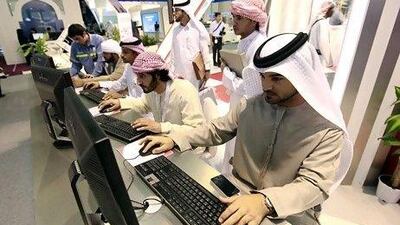Mohammed Al Olama, 21, an Emirati job seeker who graduated from the American University in Dubai with a major in finance, has a complaint.
"There's a demand for workers across many non-oil sectors, yet the unemployment rate is increasing and it's a challenge to find a job," Mr Al Olama says. "I'm confused."
He is not the only one.
Many Emirati youth who attended the Tawdheef career fair that was held from January 31 to February 2 at the Abu Dhabi National Exhibition Centre were left wondering whether such initiatives are a shop window for companies, or a genuine source of hope for young graduates looking to enter the workforce.
More than 26,000 Emiratis pre-registered for the recruitment exhibition, billed as an opportunity to bring together job hopefuls with more than 100 companies eager to hire them, but many left the career fair feeling discouraged.
On Twitter, the hashtags #Tawdheef and #Emiratisation told a story of increasing disillusionment. This followed an Arabic newspaper front-page story headlined "Unmanned recruitment company stall with a huge stack of résumés on the floor". The article was accompanied by an image of the abandoned résumés.
"And sorry to all the hopeful job applicants who can't even get in @ADNEC Either way your CVs would be chucked in the trash tonight #Tawdheef," said Asma Baalawy, 30, an Emirati with a marketing background and more than nine years' experience in the public and private sectors.
Talib Al Hashimi, an Emirati entrepreneur who co-founded the recruitment firm Next Level, added: "A msg to all the jobseekers I met last week in TAWDHEEF career fair: We must accept finite disappointment, but never lose infinite hope".
Hope may be in plentiful supply, but jobs are looking scarcer.
Nearly 65 per cent of the Emirati population in Abu Dhabi is aged under 25, according to Abu Dhabi's Economic Vision 2030.
By 2020, unemployment in that age bracket is forecast to reach almost 30 per cent, a staggering figure. It suggests a serious problem on our hands that needs to be tackled urgently.
But how do we do it? I suggest that career fairs, along with other initiatives to try to solve the problem in one fell swoop, are not the answer. Instead, we need to look at individual development, even if that is a more daunting task at first glance.
Emiratisation must not be used simply to fill a quota, but to ensure that the right people are put in the right jobs. If we are to build a sustainable economy, we need to ensure that Emiratis are not merely employed for the sake of fulfilling a quota but are hired in an environment that matches their skillsand at the appropriate positions in their own professional development. Emiratis must be equipped with the right skills, qualifications and work ethic to make them competitive in the private sector and internationally.
Admittedly, the current competitive landscape does not make this easy as organisations battle among themselves to hire those Emiratis who have the skills that they are seeking. This creates a situation where Emiratis who have been unable to find meaningful work or an environment to nurture their talents do not develop sufficiently to be seen as an asset. As a result, they struggle to find work. A classic chicken-and-egg scenario.
There has to be a shift towards a more collaborative approach when it comes to human capital, talent development and Emiratisation.
Emiratisation needs to be more than just an end goal in itself. AsMs Baalawy warns: "If Emiratisation became a way for companies to satisfy a quota, they are exploiting the plight of job seekers by misusing the meaning of Emiratisation."
Emirati role models are desperately needed across industries.
Driving awareness of Abu Dhabi's Economic Vision 2030 and emphasising the role our youths of today can play in transforming this vision into reality is a positive first step. We need to provide Emiratis with the correct incentives beyond merely economic or prestigious ones (such as working for the handful of large government or semi-government organisations).
Creating a community-wide platform where youths, parents, educators, non-governmental organisations, private and public-sector bodies not only meet but also devise and implement solutions to the growing number of unemployed Emiratis is a must.
Being regularly aware, informed and engaged about what the country needs, and what's happening around us (locally and globally), is a crucial ingredient for success.
In essence, we need to enhance the career path experience for youths.
Finally, as Emiratis, we need to take full responsibility for the economic development of our country. This means that we need to expand our horizons beyond the traditional career paths and enter fields and sectors that we have historically shunned.
We need to overcome our aversion to working in certain professions, take full ownership of our nation's economic growth, and leave our unique Emirati imprint on all sectors of our economy, and at all levels.
Only then can we say that we, as Emiratis, are genuinely playing a role in our nation's prosperity.
Amina Taher is a mother, entrepreneur and a communications professional in one of the Abu Dhabi Government's investment companies

